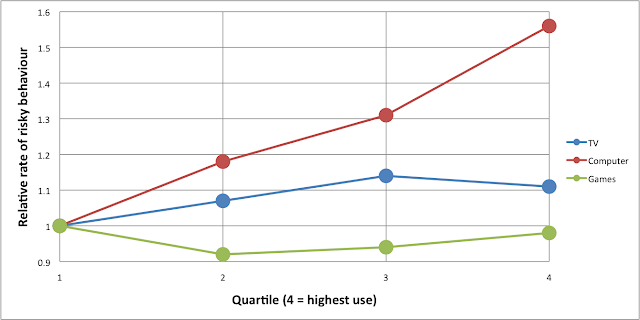 |
| Image courtesy of xkcd |
Well, not so much bad as ... interesting, which is what what good research should be. A team from from Queen's University, Kingston in Canada has been looking at the connection between different kinds of screen time and risky behaviour in teenagers (I'm afraid you have to pay or have some kind of academic access to get a full copy of the paper). Carson, Pickett and Janssen took a measure of risky behaviour (you can see full the details in the paper, but essentially it was a combined measure of smoking, drunkenness, non-use of seat-belts, illicit drug use and non-use of condoms) and compared it with three different kinds of screen use: watching TV, general computer usage and playing video games. As you'll see from the graph below, teenagers who spent a lot of time using their computer "normally" showed a much higher rate of risky activity than those with low computer usage. The amount of time playing video games had very little effect.
 |
| My own graph, produced using the data in the paper. Any mistakes or misunderstandings are probably down to me! |
In other words, if your kid spends all day playing WOW, it's fine. It's all that "normal" internet usage you want to worry about! The authors speculate that the increased impact of computer use compared to watching TV is that the latter is far more effectively regulated, so it's easier for teenagers to access "unsuitable" material. I'd suggest another contributing factor: social networks vastly increase the quantity of peer-pressure that kids are subject to, so the pressure to copy what all the cool/rebellious (depending on whether you're a teenager/parent) kids are doing also increases.
So delete little Johnny's Facebook account and buy him Call of Duty. Just think of the children!
Beyond irony update (28/04/11): South Korea appears to be moving to limit children's game play time. The article doesn't mention any such limits on TV or "normal" computer use. Evidence of harm? Who needs it?


I absolutely love hearing about this kind of stuff. I really appreciate you bringing this to me since, it being from Canada, the American media probably wouldn't "bother" to pick it up. I find the results fascinating (and your post's tone goes well with the implications). Thanks!
ReplyDeleteI haven't read the paper. Do they normalise the populations for other possible factors influencing risk averseness? For example, do children with a tendency to enjoy computer games have different characteristics than the population average, and are those characteristics better correlated with the end-variables (of smoking etc)?
ReplyDeleteAs I understand it, they have attempted to correct for other factors (e.g. relationship with parents), but you're right to point out that these things matter. To be fair, we should emphasise that correlation does not prove causation, so all we can say is that there appears to be no connection between gaming and the risk factors studied.
ReplyDelete